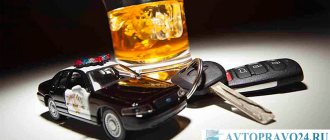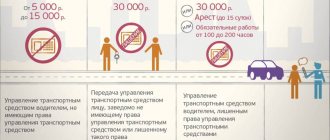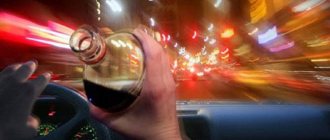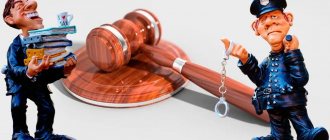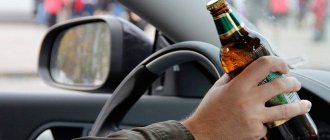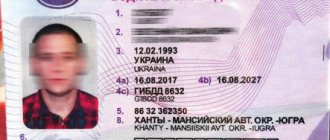Good afternoon, dear reader.
Driving while intoxicated is one of the most serious offenses a driver can commit. Moreover, responsibility for this violation becomes more serious over time.
If a few years ago the driver only faced deprivation of his license, then in 2021 you can “earn” a large fine, forced labor, and even imprisonment.
In this article you will find out what punishment awaits a driver who gets behind the wheel drunk:
- Driving while intoxicated.
- Punishment for a drunk driver without a license.
- The second control is intoxicated.
- The third management is intoxicated.
- Transferring control to a drunk driver.
- Table of penalties for drunk driving.
- Discount for paying fines.
- Amnesty for those deprived of their rights.
Liability for drivers while intoxicated is provided for by the following regulatory documents:
Code of Administrative Offenses Article 12.8 Code of Administrative Offenses Article 12.26 of the Criminal Code of the Russian Federation Article 264
Driving while intoxicated
The simplest option is for the driver to get behind the wheel while intoxicated:
1. Driving a vehicle by a driver who is intoxicated, if such actions do not constitute a criminal offense, -
shall entail the imposition of an administrative fine in the amount of thirty thousand rubles with deprivation of the right to drive vehicles for a period of one and a half to two years.
The driver expects:
- deprivation of rights for a period of 18 to 24 months ;
- fine 30,000 rubles .
Punishments are imposed simultaneously.
Note. The exact same punishment awaits the driver who refused a medical examination for intoxication (Part 1 of Article 12.26 of the Administrative Code).
Where will the car be delivered if your license is revoked for drunkenness?
When detained, the car is evacuated to the nearest impound lot; in the future, everything that happens to the car is regulated by Article 27.13 of the Administrative Code and amendments to it. A traffic police officer has the right to call a tow truck even in the absence of the driver, filming the evacuation on camera or conducting it in the presence of witnesses.
Make sure to fill out the protocol: it must indicate the characteristics of the machine, a description of the equipment and problems. In case of negligent towing or breakdowns due to the fault of the traffic police, you can receive compensation.
You can find out at which impound lot the car is located in a copy of the arrest report. The inspector is obliged to issue a document to the driver if the evacuation was carried out in his presence: the protocol indicates the department of the state traffic inspectorate that made the arrest, as well as the location of the impound lot.
If the car was towed without a driver, information about the detention can be obtained from a centralized database at any traffic police duty station.
Punishment for a drunk driver without a license
The following variant of the violation is when a driver, deprived of his license or initially without one, is caught by the police while intoxicated:
3. Driving a vehicle by a driver who is intoxicated and does not have the right to drive vehicles or is deprived of the right to drive vehicles, if such actions do not contain a criminal offense -
entails administrative arrest for a period of ten to fifteen days or the imposition of an administrative fine on persons against whom administrative arrest cannot be applied in accordance with this Code in the amount of thirty thousand rubles.
The driver will face one of the following penalties:
- administrative arrest for 10 - 15 days ;
- fine 30,000 rubles.
Please note that the fine is imposed only on the following categories of citizens:
- pregnant women;
- women with children under fourteen years of age;
- persons under the age of eighteen;
- disabled people of groups I and II;
- military personnel;
- citizens called up for military training;
- employees of the Investigative Committee of the Russian Federation, internal affairs bodies, bodies and institutions of the penal system, troops of the National Guard of the Russian Federation, the State Fire Service and customs authorities with special ranks.
Everyone else will be arrested.
Note. The exact same punishment awaits a driver who does not have a license and refuses a medical examination for intoxication (Part 2 of Article 12.26 of the Administrative Code).
Alcohol consumption standards according to traffic rules
There are clearly defined alcohol content standards, exceeding which constitutes a violation. They were established by the same Decree of the Government of the Russian Federation No. 475, as well as by the corresponding Order of the Ministry of Health:
- 0.16 milligrams of ethyl alcohol per liter of exhaled volume. Applies in accordance with Art. 8 RF PP No. 475 for the initial “on-site” inspection, i.e. using certified devices of traffic police officers;
- 0.3 grams per liter of biomaterial (blood). Determined in the conditions of medical institutions (medical examination) on the basis of Article 15 of Order of the Ministry of Finance No. 933n.
Set minimums are often referred to as the “legal alcohol limit.” We would not recommend considering that such a quantity exists, because... These parameters correspond to the technological errors of instruments and equipment used to determine intoxication. That is, similar figures can be recorded in completely sober people.
Repeated driving while intoxicated
The punishment for repeated violation deserves special attention. Let me remind you that a repeated violation is committed within 1 year from the end of the previous period of deprivation. In this case, the date the license was returned to the driver is important.
Let's consider part 1 of article 2641 of the Code of Administrative Offenses:
1. Driving a car, tram or other mechanical vehicle by a person in a state of intoxication, subject to administrative punishment for driving a vehicle while intoxicated or for failure to comply with the legal requirement of an authorized official to undergo a medical examination for intoxication -
shall be punishable by a fine in the amount of two hundred thousand to three hundred thousand rubles, or in the amount of the wages or other income of the convicted person for a period of one to two years, with deprivation of the right to hold certain positions or engage in certain activities for a term of up to three years, or with compulsory labor for a term of up to four hundred eighty hours with deprivation of the right to hold certain positions or engage in certain activities for a term of up to three years, or forced labor for a term of up to two years with deprivation of the right to hold certain positions or engage in certain activities for a term of up to three years, or imprisonment for a term of up to two years with deprivation of the right to hold certain positions or engage in certain activities for a period of up to three years.
So, for the second violation the driver will receive one of the following penalties:
- Fine 200,000 - 300,000 rubles .
- A fine in the amount of the convicted person’s income for 1 to 2 years.
- Compulsory work for up to 480 hours.
- Forced labor for up to 2 years.
- Imprisonment for up to 2 years.
In addition, in addition to the penalties listed above, the driver will be deprived of his license for up to three years.
Please note that the crime is criminal, i.e. the driver may receive a criminal record . In this case, a criminal record is retained for 3 years (in case of imprisonment) and 1 year (for other punishments).
Registering with a narcologist
According to Art. 20 Federal Law No. 323, medical intervention without a person’s consent is prohibited, that is, it is impossible to register with a narcologist without the desire of the violator. In Art. 29 Federal Law No. 3285-I, the exception is the conclusion of a medical commission, according to which a person can harm others because he suffers from mental illness, including delirium tremens.
Theoretically, registration with a narcologist is possible if:
- the offender has expressed a desire to undergo treatment;
- a narcologist examined the citizen during a medical examination;
- the driver is undergoing treatment from a specialist in another city.
In Art. 13 Federal Law No. 323 notes the need to maintain medical confidentiality, therefore narcologists do not issue certificates and do not respond to requests from law enforcement agencies.
They will be forcibly registered with a narcologist on the basis of Letter of the Ministry of Health No. 14-2/2017686, according to which chronic alcoholism and alcohol abuse are reasons for restrictions in driving a vehicle. There are also:
- detaining the driver at the crime scene;
- identification during the investigation of processes of destabilization of the offender’s psyche under the influence of alcohol;
- the court declares the offender incompetent and sends him for psychiatric treatment;
- registration with a narcologist at the place of residence - if there is documentary evidence; evidence of insanity based on the results of a psychological and psychiatric examination.
Important! The offender must decide to see a narcologist voluntarily. Only a court can limit legal capacity.
Third driving while intoxicated
Starting from July 12, 2021, the Criminal Code also introduced a separate punishment for drivers who have previously been prosecuted for driving while intoxicated. Such a penalty may be imposed during the period while the driver is considered to have a criminal record . That is, within 3 years after completion of a term of imprisonment or within 1 year after completion of other criminal penalties.
Let's consider part 2 of article 2641 of the Code of Administrative Offenses:
2. Driving a car, tram or other mechanical vehicle by a person in a state of intoxication, who has a criminal record for committing a crime while intoxicated, provided for in parts two, four or six of Article 264 of this Code or this article -
shall be punishable by a fine in the amount of three hundred thousand to five hundred thousand rubles, or in the amount of the wages or other income of the convicted person for a period of two to three years, with deprivation of the right to hold certain positions or engage in certain activities for a term of up to six years, or by correctional labor for a term of up to two years with deprivation of the right to hold certain positions or engage in certain activities for up to six years, or restriction of freedom for up to three years with deprivation of the right to hold certain positions or engage in certain activities for up to six years, or forced labor for up to three years with deprivation of the right to hold certain positions or engage in certain activities for a term of up to six years, or imprisonment for a term of up to three years with deprivation of the right to hold certain positions or engage in certain activities for a term of up to six years.
So, for the third violation the driver will receive one of the following penalties:
- Fine 300,000 - 500,000 rubles .
- A fine in the amount of the convicted person’s income for 2–3 years.
- Correctional labor for up to 2 years.
- Restriction of freedom up to 3 years.
- Forced labor for up to 3 years.
- Imprisonment for up to 3 years.
In addition, in addition to the penalties listed above, the driver will be deprived of his license for up to six years.
Please note that the crime is criminal, i.e. the driver may receive a criminal record . In this case, a criminal record is retained for 3 years (in case of imprisonment) and 1 year (for other punishments). If the driver gets behind the wheel while intoxicated during these periods, he will once again be held accountable for a “third violation.”
What to do if you are wrongfully accused of drunk driving
Let's imagine that an inspector is trying to catch a driver drunk driving, but they want him to be sober. Then we must demand that the policeman act according to the law and express disagreement with the protocol. Automotive lawyer Alexander Torvard recommends taking the following steps:
- Ask what signs of alcohol intoxication he sees. In this case, you can record his answer on video.
- Ask for a protocol on removal from driving a vehicle - he must draw up this document first, even before offering a breathalyzer. The document may be useful in court.
- If possible, immediately call the autotourist and consult directly on the spot.
- Ask for the inspection report and technical passport of the breathalyzer, check the integrity of the seals on the device and breathe into a new tube from a previously unopened package. If there are no such documents, request a medical examination at the hospital.
- Demand that the test be carried out according to the law: in the presence of two witnesses or on video recording.
- Write in the protocol “I did not drink alcohol, I do not agree with the charges.”
If the case goes to court, we recommend that you participate in the hearings and involve a car lawyer. If the court rules not in favor of the driver, the decision can be appealed to a higher authority.
Transferring control to a drunk driver
In addition to the driver himself, who is in a state of intoxication, the person who handed over control to the drunk may also be held liable:
2. Transferring control of a vehicle to a person who is intoxicated –
shall entail the imposition of an administrative fine in the amount of thirty thousand rubles with deprivation of the right to drive vehicles for a period of one and a half to two years.
In this case, the following penalties will be imposed on the driver (at the same time):
- deprivation of rights for a period of 18 to 24 months;
- fine 30,000 rubles .
Thus, the person who handed over control to a drunk receives exactly the same punishment as the driver himself while intoxicated.
Paragraph 12 of the resolution of the plenum of the Supreme Court No. 20 of June 15, 2021 contains the following features of bringing to justice :
1. For transferring control to a person in a state of intoxication, not only the owner of the car, but also another driver who directly transferred control to the drunk can be punished.
For example, the car belongs to Alexander. Alexander transferred control of the car to his son Boris by proxy. Boris handed over control to his friend Vadim, who was intoxicated.
In this case, it is not Alexander, who owns the car, who should be punished for transferring control, but Boris, who directly transferred control to the drunken Vadim.
2. The fact that control was transferred to a drunk driver must be proven by an official.
For example, if a drunk driver independently took the car keys from the shelf, and the owner of the car did not even suspect it, then no punishment should be imposed.
Payment period
To pay the fine, the driver is given 70 days from the date of the decision on an administrative offense against him by a traffic police officer or the sentencing of a magistrate (in the case of driving while intoxicated).
These 70 days include three periods:
10 days from the date of delivery to the owner of the car of a copy of the decision on an administrative offense is the period within which the fine can be appealed.
- The date of notification of the car owner about the administrative case opened against him will be considered the date of delivery to him of the postal notice or notification of the receipt of an e-mail in the personal account of the State Services portal.
20 days from the date of the decision is a grace period during which the fine can be paid with a 50% discount.
- 20 days are counted from the date of the decision, regardless of whether the driver knew about it or not.
- The grace period is not suspended during the appeal period - if the proceedings drag on and the fine is not cancelled, it will no longer be possible to pay it at a discount.
50 days after the end of the grace period is the deadline for paying the full amount of the fine. If you miss this deadline, the traffic police will transfer the case to bailiffs.
Table of penalties for drunk driving
Let's look at all the penalties listed above in table form:
| Article | Violation | Deprivation of rights, months | Additional punishment |
| 12.8 part 1 12.26 part 1 | Driving while intoxicated or refusing medical examination | from 18 to 24 | 30,000 rubles |
| 12.8 part 3 12.26 part 2 | Driving while intoxicated or refusing medical examination by an unlicensed driver | Arrest 10 - 15 days or 30,000 rubles | |
| 2641 part 1 of the Criminal Code | Second driving while intoxicated | up to 36 | Fine 200,000 - 300,000 rubles or a fine in the amount of the convicted person's income for 1 - 2 years or compulsory labor for up to 480 hours or forced labor for up to 2 years or imprisonment for up to 2 years |
| 2641 part 2 of the Criminal Code | Third driving while intoxicated | up to 72 | Fine 300,000 - 500,000 rubles. A fine in the amount of the convicted person’s income for 2–3 years. Correctional labor for up to 2 years. Restriction of freedom up to 3 years. Forced labor for up to 3 years. Imprisonment for up to 3 years. |
| 12.26 p.2 | Transferring control to a drunk driver | from 18 to 24 | 30,000 rubles |
Medical examination procedure
In 2021, a new procedure for medical examination is in effect. Now the inspector is required to write a protocol in the presence of two witnesses - a referral to the procedure using a standard form.
Witnesses put their signatures on the document.
The suspect is sent to a medical facility, accompanied by a traffic police representative. A health care facility must have a license and employees with a permit valid for 36 months.
In the laboratory, the motorist is tested with a breathalyzer; additionally, blood or urine is taken for a chemical and toxicological analysis. Even if the inspector’s device showed 0.16 ppm, the medical institution will check again. The interval between exhalations is 15–20 minutes. If the first test is negative, the second one is not performed. A blood test can detect alcohol-containing metabolites, which can give a result of more than 0.3 ppm.
The results of the research are reflected in a report drawn up in a standard form.
One copy of the document remains in the hospital, the second - with the State Traffic Inspectorate employee, and the third - with the violator.
Important! Refusal to go for examination confirms drunken state. The procedure also cannot be refused in a medical facility. This will result in an automatic fine and revocation of your license.
How to challenge the revocation of a driver's license for drunkenness?
You can begin to challenge the deprivation of your license for drunkenness by filing a petition with the traffic police. The application in 2021 must be substantiated, with evidence of violations by the inspector when preparing documents or conducting a procedure.
If the application is rejected, the case will be heard in court. The decision of the city court can be challenged in the district and regional within 10 days after receiving the decision. To challenge the deprivation of rights, you should choose a line of defense; three directions are most often used.
The first is an independent examination. Used when the inspector and the clinic doctor have confirmed intoxication. For a successful defense, it is necessary that the examination be quick (no later than an hour or two after the state), with a blood test taken, the clinic must have a special license.
The second is the illegality of the employees’ actions. Any errors or illegal actions will be interpreted in your favor. For example, if an employee’s protocol is filled out incorrectly, it becomes invalid and is not considered a document by the court.
Third, there is evidence that the car was not going anywhere. If the car is on the side of the road and not involved in traffic, driver intoxication is not a violation.
At the stage of re-appeal, it is recommended to contact a lawyer, who will help you formalize the case and find new nuances in it that were missed by the lower court.
Getting your driver's license back after being revoked for drunkenness
You can return your license after being deprived of your license for drunkenness in 2021 in the same department of the traffic police that made the confiscation, after the end of the sentence. To return, the driver will have to pass a theoretical test on knowledge of the rules, and also be required to pay all outstanding fines before the traffic police .
The procedure for returning rights is as follows:
- Submit an application to the MREO for the return of rights.
- Find out the scheduled date and time for the test.
- Perform the test and receive a certificate of a positive result.
- Come to the traffic police with a package of documents at the end of your sentence.
The rule knowledge test can be completed in advance, after half the term has expired. In content, it is similar to the exam for obtaining a license, with the absence of questions on psychology, medicine and knowledge of the administrative code. The test consists of 20 questions with a pass rate of 90%, with a time limit of twenty minutes. If you fail, you can retake the exam after seven days.
When returning a license, the driver is required to have a passport, a copy of the court order on deprivation, a certificate of passing the exam and a medical certificate with a current validity period, as well as mandatory notes from a narcologist and a psychiatrist.
How to pick up a car from a parking lot?
You can pick up a car from an impound lot if your license is revoked for drunkenness in 2021 in four steps.
- Eliminate the reason for the detention. If your license has been revoked for drunk driving, write out a power of attorney to a family member or friend.
- Take the arrest report. When evacuating a car, a protocol must be handed over to you in your presence; if you do not have one, contact the duty officer of the traffic police department who carried out the arrest.
- Obtain written permission from the traffic police department to remove the car from the impound lot.
- Pick up your car from the impound lot.
The traffic police duty station operates 24 hours a day, seven days a week. You can pick up the car at any time; in case of delay or refusal, file a complaint with the internal affairs authorities.
